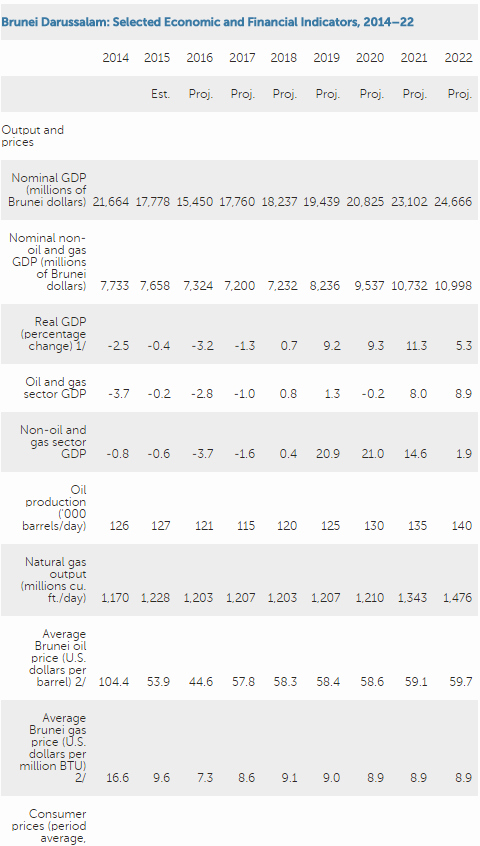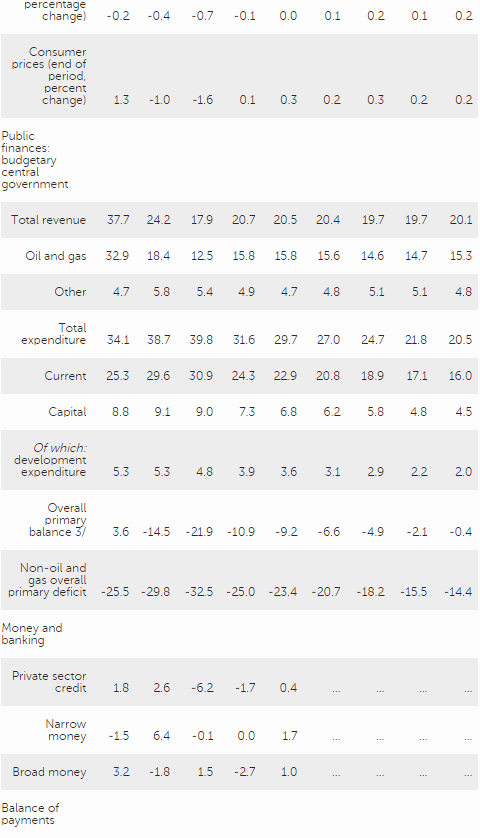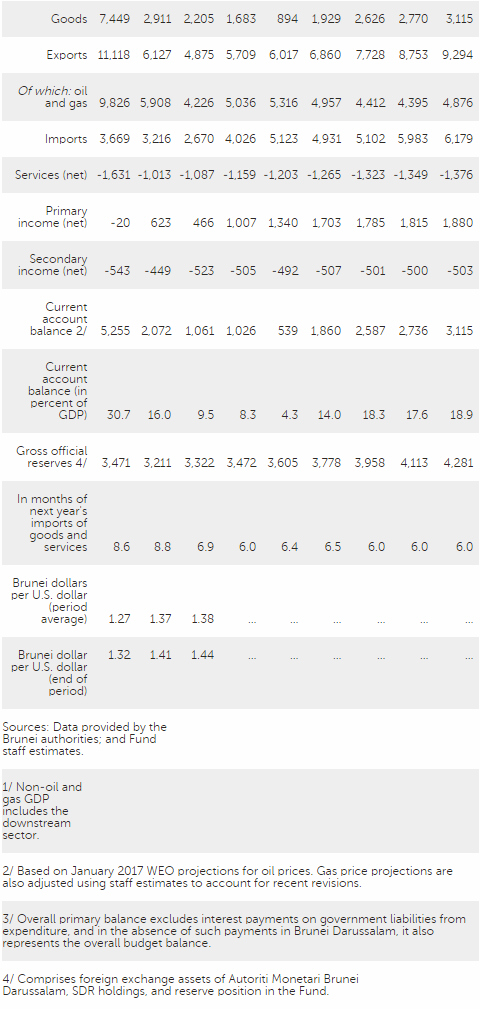IMF Executive Board Concludes 2017 Article IV Consultation with Brunei Darussalam
On April 25, 2017, the Executive Board of the International Monetary Fund (IMF) concluded the Article IV consultation with Brunei Darussalam and considered and endorsed the staff appraisal without a meeting on a lapse-of-time basis.
Building on a track record of policy reforms, Brunei Darussalam’s economy is adjusting to lower oil and gas (O&G) prices. While the country possesses sizable buffers, the authorities have continued structural reforms aimed towards ensuring long-term sustainability and intergenerational equity, increasing productivity and competitiveness, and diversifying the sources of growth.
Latest estimates showed that real GDP in 2016 further declined by 2.5 percent, contracting by less than projected. Unscheduled shutdowns were the main factor that disrupted O&G production. Meanwhile, the decline in non‑O&G GDP reflected mainly the ongoing fiscal consolidation. Inflation averaged -0.7 percent in 2016, driven by a downward correction in the housing rental market, lower air transport costs, and a continued decline in food-related import prices. The current account surplus is estimated to have narrowed further on lower O&G exports.
Economic growth and macroeconomic balances are expected to strengthen markedly from 2019 onwards as new energy downstream facilities come on-stream. In 2017, pending a full pick-up in the construction of large foreign direct investment (FDI) projects, the economy is projected to register a smaller decline, with growth turning positive by 2018. Fiscal balances are projected to recover over the medium term, but remain in deficit for several years. The current account surplus is projected to narrow further until 2018 due to imports associated with the construction of FDI projects. Main risks arise from further unscheduled shutdowns and lower-for-longer O&G prices that could further reduce fiscal revenues and impact the viability of the country's longer-term energy strategy.
Building on reforms prior to the late-2014 oil price slump, the government launched the latest series of reforms since 2015, aiming to reduce wastages, and implementing structural reforms to support FDI, small and medium-sized enterprises (SMEs) and economic diversification. Brunei was among the most improved economies in the 2017 Doing Business rankings. Recent advances include substantive progress on improving the regulatory environment, the implementation of program and performance budgeting for all line ministries, and facilitation of FDI projects and SME development through agencies that were newly created in early 2016. Meanwhile, the aggregation of government-linked companies under Darussalam Assets aims to enhance productivity, efficiency and profitability. In addition, a Financial Sector Blueprint has been released to help develop the financial sector over the next decade.
A FY2017/18 budget of B$5.3 billion was passed in March 2017 with a theme of balanced expenditure to support sustainable economic growth. Policies announced during the budget included new excise taxes on sugary drinks and products and mono-sodium glutamate and increased tobacco excises, an income tax board of review, as well as the establishment of a new SME bank, a free trade zone to support exports, and an apprenticeship program for unemployed graduates.
Executive Board Assessment
In concluding the 2017 Article IV consultation with Brunei Darussalam, Executive Directors endorsed staff’s appraisal, as follows:
Brunei continues to adjust to lower O&G prices, building on past reforms. While the country can continue absorbing the O&G revenue slump for many years by drawing down its sizable buffers, the likely lower-for-longer energy prices as well as O&G production disruptions associated with aging fields reinforce the need to accelerate and broaden the reforms to ensure long-term sustainability and intergenerational equity, increase productivity and competitiveness, and diversify the sources of growth.
The growth outlook is challenging in the near term, but improves toward the medium term. Continued production challenges associated with aging O&G fields and further government spending restraint is projected to result in negative GDP growth in 2017. Growth would turn positive in 2018 reflecting the bulk of investment execution for an integrated petrochemical refinery and a fertilizer plant. Large imports linked to the construction of these two projects would lower the CA surplus in 2017–2018. The trend of mild deflation is projected to ease by 2018, mainly as a result of higher import prices. Fiscal balances are projected to recover slowly and remain in deficit territory before approaching balance in 2022. Over the medium term, the growth outlook further improves with the start of downstream production from the aforementioned projects, a new gas field, and public investment under the next five-year development plan. These are projected to result in robust GDP and export growth in 2019–2022.
The Brunei dollar and the current account are broadly consistent with fundamentals over the medium- to long term, albeit with lower CA surpluses in the near term due to the oil terms-of-trade shock. The peg to the Singapore dollar remains appropriate to provide regional trade and investment certainty and meet Brunei’s external investment needs.
The balance of risks is tilted to the downside, reflecting both external and domestic factors. Lower-for-longer O&G prices, continued unscheduled disruptions of domestic O&G production, and delays in completing FDI-driven downstream projects could dampen the short- to medium-term outlook and slow down the diversification process. The risk of a further reduction of financial services by foreign banks could disrupt the provision of financial services, deposit mobilization, and credit flows. Retreat from cross-border integration by major economies could lead to reduced international policy collaboration with negative consequences for Brunei and the global economy. On the upside, a better-than-expected impact of the O&G asset rejuvenation program could recover production in the next few years.
Fiscal policy reforms should be broadened and growth-friendly consolidation deepened. The FY 2017/18 budget envelope should entail additional savings relative to staff’s baseline, achieved with a fuel subsidy reform and a streamlining of the wage bill and sustained into the medium term. This would result in a balanced budget one year earlier than the baseline. The reallocation from wasteful, non-productive spending to growth-enhancing spending would help mitigate the adverse impacts of consolidation on non-O&G GDP growth and SMEs. Over the medium term, recommended measures include a reduction in untargeted subsidies on housing, food, and health care, accompanied by mitigation measures where appropriate, reducing the government’s employment share and relative wages as well as continuing the efforts on commercialization and privatization of state-owned enterprises. Non-O&G revenues should be broadened by recalibrating the system for property taxes, expanding excise taxes and further laying the groundwork for a GST.
Fuel subsidy reform should be implemented. Based on the experience of successful reforms in other countries, a comprehensive reform strategy should include measures to mitigate the effects on vulnerable groups.
Intensified PFM reforms would help achieve greater spending efficiency. Critical reforms include incorporating subsidies and extra-budgetary funds in the budget presentation, improving management and monitoring of public expenditure, and tightening controls to minimize overruns.
The financial sector regulatory and supervisory framework should be further enhanced, and financial sector development elevated through the new blueprint. To improve financial system efficiency and ensure banks’ profitability, the AMR should be reduced in a phased manner to a level closer to international standards, and the remaining interest rate controls should be removed, in particular the regulated rates on lending to micro-enterprises and SMEs. Staff also supports the ongoing development of a contingency planning and crisis management framework for the banking system. The authorities’ 10-year Financial Sector Blueprint is a welcome development, and would help authorities chart a course for developing the system, including to make Brunei an Islamic finance hub in niche areas. Meanwhile, the winding down of a large foreign bank has proceeded smoothly thus far, and new bank entrants should facilitate increased linkages and financial system development.
While business climate developments have been promising, the authorities should continue the efforts to improve the regulatory framework, develop local SMEs and attract FDIs. Cost and time of regulatory and policy procedures such as enforcing contracts and exporting should be further reduced, and implementation of local labor development programs beyond the O&G sector should be carefully designed. Staff welcomes the expansion of Darussalam Assets as a government investment holding company, and supports its reforms to increase GLC’s profitability. SME development and youth employment should be further enhanced by building on current efforts in improving access to finance, enhancing human capital development, and leveraging on technology.
The new ‘3-T’ (integrating technology, training and TA) mission outreach helped increase engagement with authorities, and staff welcomes continued efforts to improve statistics and build technical capacity. The brief sampler lectures presented at the end of key meetings, combined with walk-throughs of IMF online training and data resources scaled-up and enriched opportunities for engagement with country officials. Meanwhile, staff encourages the authorities to undertake a data ROSC.



Source: International Monetary Fund
- 337 reads
Human Rights
Fostering a More Humane World: The 28th Eurasian Economic Summi

Conscience, Hope, and Action: Keys to Global Peace and Sustainability

Ringing FOWPAL’s Peace Bell for the World:Nobel Peace Prize Laureates’ Visions and Actions

Protecting the World’s Cultural Diversity for a Sustainable Future

Puppet Show I International Friendship Day 2020

